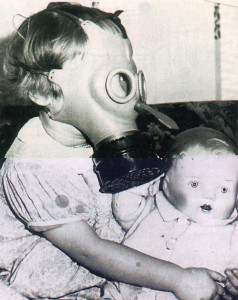 In 1940, at the age of five, I was trained for my first very important job. It was unpaid – but I was assured it would save lives.
In 1940, at the age of five, I was trained for my first very important job. It was unpaid – but I was assured it would save lives.
As Chief Air Raid Warden, my father had to distribute gas masks This wasn’t as easy as it sounds, people’s heads had to be measured and the mask fitted properly to ensure no gas could break the seal.
At first my father spent each evening after work knocking on every door in his section trying to get people to sit still long enough to be fitted with a gas mask. Because the war until now had been a phoney one, they were not interested. Mostly he was told, impolitely, where to stick them. He came back night after night dispirited saying: ‘You’d think I was the enemy when I’m only trying to save their lives.”
When the first air raids hit London and people began to take the war seriously, everyone panicked. I watched from the upstairs window as a long crocodile of people queued continuously for three days and nights outside our house My father insisted on doing the job properly and fitting everyone individually
Mother said: ‘Just throw them a gas mask each and let them fit their own. First they were rude, now they are creating at having to wait their turn.” My job was to wear two different sorts of mask The Mickey Mouse one which I loved, although on reflection wasn’t very pretty, and the ordinary Junior mask. Children would come into the room in tears at the thought of putting this hideous thing on their faces and I was trained to calm them down by saying it was fun to wear them. Even parents wanted reassurance that their children would not suffocate.
When the fittings lasted all night, I took catnaps on the floor with my head on a cushion, still wearing the gas mask. My dad would say: “If I let my own daughter sleep in one you can be sure they are safe.” Sometimes people prodded me to see if I was still alive.
I grew used to the smell of rubber and would run round the room demonstrating that wearing the mask did not cut off air supply, just filtered it. An extra filter was later added.
I ferried sandwiches into my father who didn’t take a break for the first 39 hours. Then, too tired to focus properly on the measurements, he took a two-hour nap. I sat on the stairs watching as my mother pushed people physically into the street and slammed the door. It was immediately pounded upon by angry people which I found quite frightening. Mother, however, was made of sterner stuff. “Serve them right, they should have let your father fit them days ago,” she said.
The elephant-style respirators for babies met with a lot of resistance because they needed pumping all the time the baby was inside. Besides being extremely tiring, if anything happened to the person pumping, the baby did suffocate. They were nicknamed ‘coffins’ and I don’t know anyone who actually used one.
Gradually, the crowds thinned out and when it came to parting with the last Mickey Mouse gas mask – which I fancied myself – I cried because I did not want the other child to have it. She had been resisting putting it on until she saw how much I wanted it. Then, with a triumphant grin, she allowed it be fitted and ran out through the door laughing. Her father told dad: ‘Your child is only tiny, you should have let her keep it as a reward for giving the demonstrations.” I was fitted with a Junior-sized mask.
Even today, certain smells remind me of the war. Rubber means gas masks while wet concrete conjures up images of the enormous school shelters deep underground in Southgate, London, where we had most of our lessons.
Pamela Strange








